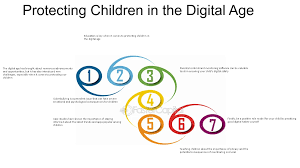


Child online protection laws are crucial in ensuring the safety, privacy, and well-being of children as they navigate the complexities of the internet. This article explores the significance of child online protection laws, their implementation, challenges, and the evolving landscape of digital safety for children.
Understanding Child Online Protection Laws
Child online protection laws encompass legal frameworks, regulations, and policies designed to protect minors from online risks such as cyberbullying, exploitation, inappropriate content, and privacy violations. These laws aim to establish safeguards and guidelines that promote safe internet usage among children and adolescents.
Key Components of Child Online Protection Laws
- Age Verification and Parental Consent: Laws often require platforms and websites to obtain parental consent before collecting personal information from children under a certain age. Age verification mechanisms help prevent minors from accessing age-inappropriate content.
- Privacy and Data Protection: Regulations mandate the protection of children’s personal data online, restricting the collection, use, and disclosure of such information without parental consent.
- Cyberbullying and Harassment: Legal provisions address cyberbullying and online harassment, providing mechanisms for reporting and mitigating abusive behavior directed at minors.
- Education and Awareness: Laws promote education initiatives to raise awareness among children, parents, educators, and caregivers about online risks and best practices for safe internet use.
Implementation of Child Online Protection Laws
Governments and regulatory bodies play a crucial role in implementing and enforcing child online protection laws. Key actions include:
- Legislative Frameworks: Enacting laws and regulations that establish clear guidelines and responsibilities for online platforms, service providers, and guardians.
- Monitoring and Compliance: Conducting audits and assessments to ensure that platforms and websites comply with legal requirements regarding child safety and data protection.
- Collaboration: Partnering with technology companies, non-governmental organizations (NGOs), and international bodies to develop effective strategies and tools for child online safety.
Challenges in Implementing Child Online Protection Laws
Despite their importance, child online protection laws face several challenges:
- Technological Advancements: Rapidly evolving technologies present challenges in monitoring and regulating online content and behaviors that may harm children.
- Global Nature of the Internet: Ensuring consistent enforcement across borders is complex due to differing legal standards and jurisdictional issues.
- Education and Awareness: Bridging the digital literacy gap among children, parents, and educators to effectively navigate online risks remains a continuous challenge.
Role of Stakeholders in Child Online Protection
Effective implementation of child online protection laws requires collaboration among multiple stakeholders:
- Government Agencies: Regulatory bodies oversee compliance with laws and regulations, enforce penalties for non-compliance, and promote policy advocacy.
- Technology Companies: Platforms and service providers develop and implement safety features, content moderation policies, and parental control tools to protect young users.
- Educators and Parents: Educators integrate digital literacy and online safety education into school curricula, while parents play a pivotal role in supervising and guiding children’s online activities.
Global Initiatives and Best Practices
Internationally, organizations such as UNICEF, UNESCO, and the ITU (International Telecommunication Union) promote global standards and initiatives for child online protection. Best practices include:
- Hotlines and Reporting Mechanisms: Establishing hotlines and reporting tools for children and parents to report online abuse and seek assistance.
- Digital Citizenship Programs: Introducing programs that teach children about responsible digital citizenship, ethical online behavior, and safe internet practices.
Conclusion
In conclusion, child online protection laws are essential for safeguarding children’s rights and well-being in the digital era. By fostering collaboration among governments, technology companies, educators, and parents, these laws contribute to creating a safer online environment where children can explore, learn, and connect responsibly.
This article has examined the significance, components, implementation challenges, stakeholder roles, and global initiatives related to child online protection laws. As digital technologies continue to evolve, ongoing efforts to strengthen and enforce these laws will be critical in ensuring a secure and inclusive online experience for children worldwide.
· Child Online Protection
· Digital Safety for Children
· Age Verification
· Parental Consent
· Privacy and Data Protection
· Cyberbullying Laws
· Online Harassment
· Digital Literacy
· Child Safety Regulations
· Content Moderation
· Global Online Protection Initiatives
· Safe Internet Practices
Contact Us
Chaman Law Firm today. Our offices are conveniently located in Lagos, FCT Abuja, Ogun State, and the UK. We are readily available to assist you with your legal needs. Whether you require consultation, representation, or ongoing legal support, Chaman Law Firm is your trusted partner.
Call us at 08065553671 or email us at info@chamanlawfirm.com to schedule a consultation.

